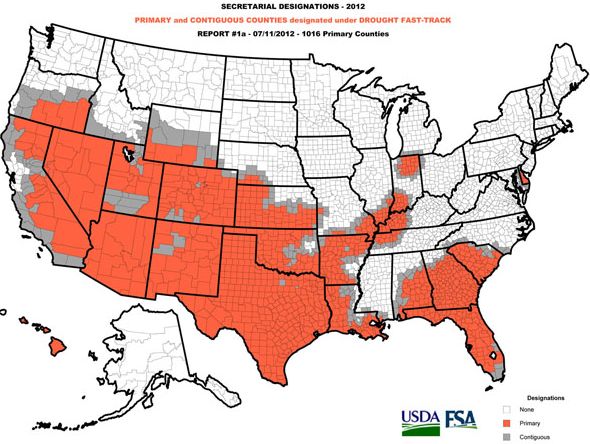
2012 drought - the worst 'natural' disaster in U.S. history
Myles Allen writes: The climate may have changed this week. Not the physical climate, but the climate of the climate change debate. Tuesday marked the publication of a series of papers examining the factors behind extreme weather events in 2011. Nothing remarkable about that, you might think, except, if all goes well, this will be the first of a regular, annual assessment quantifying how external drivers of climate contribute to damaging weather.
Some of these drivers, like volcanoes, are things we can do nothing about. But others, like rising levels of greenhouse gases, we can. And quantifying how greenhouse gases contribute to extreme weather is a crucial step in pinning down the real cost of human influence on climate. While most people think of climate change in terms of shrinking ice-sheets and slowly rising sea levels, it is weather events that actually do harm.
This week also saw a workshop in Oxford for climate change negotiators from developing countries. Again, nothing remarkable about that except, for the first time, the issue of “loss and damage” was top of the agenda. For years negotiations have been over emission reductions and sharing the costs of adaptation. Now the debate is turning to: who is going to pay for damage done?
It is a good time to ask, since the costs that can unambiguously be attributed to human-induced climate change are still relatively small. Although Munich Re estimates that weather events in 2011 cost more than $100bn and claimed many thousands of lives, only a few of these events were clearly made more likely by human influence. Others may have been made less likely, but occurred anyway – chance remains the single dominant factor in when and where a weather event occurs. For the vast majority of events, we simply don’t yet know either way.
Connecting climate change and specific weather events is only one link in the causal chain between greenhouse gas emissions and actual harm. But it is a crucial link. If, as planned, the assessment of 2011 becomes routine, we should be able to compare actual weather-related damage, in both good years and bad, with the damage that might have been in a world without human influence on climate. This puts us well on our way to a global inventory of climate change impacts. And as soon as that is available, the question of compensation will not be far behind.
The presumption in climate change negotiations is that “countries with historically high emissions” would be first in line to foot the bill for loss and damage. There may be some logic to this, but if you are an African (or Texan) farmer hit by greenhouse-exacerbated drought, is the European or American taxpayer necessarily the right place to look for compensation? As any good lawyer knows, there is no point in suing a man with empty pockets.
The only institution in the world that could deal with the cost of climate change without missing a beat is the fossil fuel industry: BP took a $30bn charge for Deepwater Horizon, very possibly more than the total cost of climate change damages last year, and was back in profit within months. Of the $5 trillion per year we currently spend on fossil energy, a small fraction would take care of all the loss and damage attributable to climate change for the foreseeable future several times over.
Such a pay-as-you-go liability regime would not address the impacts of today’s emissions on the 22nd century. Governments cannot wash their hands of this issue entirely. But we have been so preoccupied with the climate of the 22nd century that we have curiously neglected to look after the interests of those being affected by climate change today.
So rather than haggling over emission caps and carbon taxes, why not start with a simple statement of principle: standard product liability applies to anyone who sells or uses fossil fuels, including liability for any third-party side-effects. There is no need at present to say what these side-effects might be – indeed, the scientific community does not yet know. But we are getting there.

